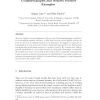Free Online Productivity Tools
i2Speak
i2Symbol
i2OCR
iTex2Img
iWeb2Print
iWeb2Shot
i2Type
iPdf2Split
iPdf2Merge
i2Bopomofo
i2Arabic
i2Style
i2Image
i2PDF
iLatex2Rtf
Sci2ools
107
click to vote
ALT
2007
Springer
2007
Springer
One-Shot Learners Using Negative Counterexamples and Nearest Positive Examples
As some cognitive research suggests, in the process of learning languages, in addition to overt explicit negative evidence, a child often receives covert explicit evidence in form of corrected or rephrased sentences. In this paper, we suggest one approach to formalization of overt and covert evidence within the framework of one-shot learners via subset and membership queries to a teacher (oracle). We compare and explore general capabilities of our models, as well as complexity advantages of learnability models of one type over models of other types, where complexity is measured in terms of number of queries. In particular, we establish that “correcting” positive examples are sometimes more helpful to a learner than just negative (counter)examples and access to full positive data.
ALT 2007 | Covert Evidence | Covert Explicit Evidence | Explicit Negative Evidence | Machine Learning |
| Added | 14 Mar 2010 |
| Updated | 14 Mar 2010 |
| Type | Conference |
| Year | 2007 |
| Where | ALT |
| Authors | Sanjay Jain, Efim B. Kinber |
Comments (0)

